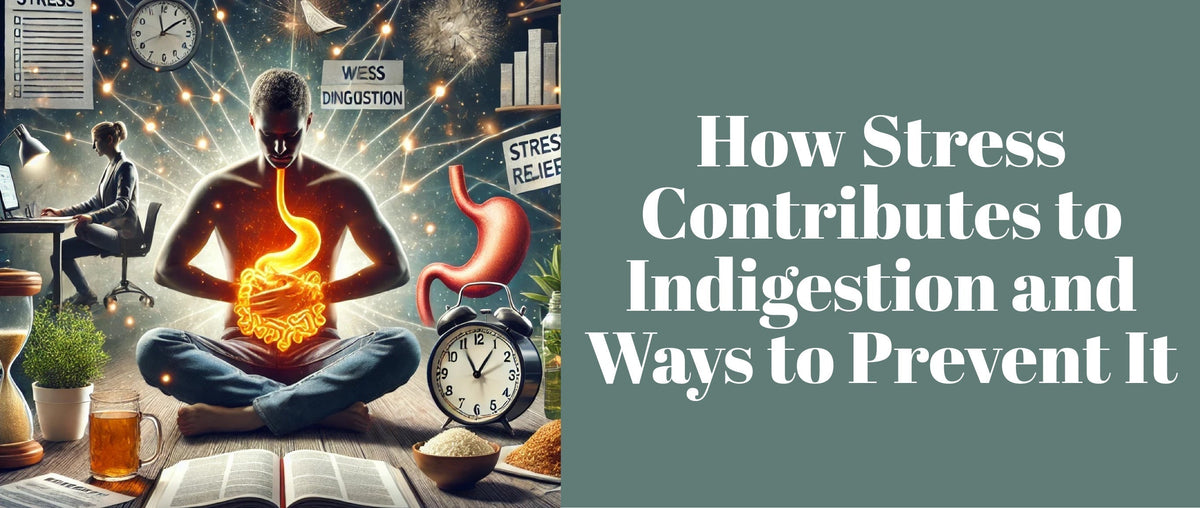How Stress Contributes to Indigestion and Ways to Prevent It
Stress is an unavoidable part of modern life, but did you know it can directly impact your digestive health? The connection between stress and indigestion is well-documented, highlighting how our mental well-being influences physical health. Chronic stress disrupts digestion, causing discomfort like bloating, heartburn, and irregular bowel movements.
Key Takeaways
- Stress affects the gut-brain axis, disrupting normal digestion.
- Conditions like GERD, IBS, and acid reflux are commonly linked to chronic stress.
- Adopting a vegan diet rich in gut-friendly foods like Kombucha and apple cider vinegar drinks can reduce stress-induced indigestion.
- Relaxation techniques, professional help, and dietary adjustments are effective preventive measures.
Understanding Indigestion and Its Causes
Indigestion (dyspepsia) is a condition characterized by discomfort in the upper abdomen, often accompanied by bloating, nausea, and a burning sensation in the chest or stomach. While it may occur occasionally, chronic indigestion can significantly affect quality of life.
Common Symptoms of Indigestion
- Bloating or fullness after eating.
- Heartburn or acid reflux.
- Nausea or vomiting.
- Excessive burping or gas.
Primary Causes of Indigestion
- Consuming fatty, spicy, or highly processed foods.
- Overeating or eating too quickly.
- Dairy-based products, unlike vegan items like oat milk, can often trigger discomfort in sensitive stomachs.
- Non-steroidal anti-inflammatory drugs (NSAIDs) such as aspirin and ibuprofen can irritate the stomach lining.
- Chronic stress alters stomach acid levels and disrupts normal digestion.

The Stress-Digestion Connection
Stress doesn’t just affect your mind—it profoundly impacts your body, particularly your digestive system. Studies have shown that chronic stress disrupts the gut-brain axis, a communication network between the brain and gastrointestinal system.
How Stress Affects the Digestive System
- Alters stomach acid production, leading to heartburn, acid reflux, or ulcers.
- Impacts gastric emptying, causing bloating or diarrhea.
- Disrupts gut microbiota, leading to conditions like Irritable Bowel Syndrome (IBS).
Ways to Prevent Stress-Induced Indigestion
Lifestyle Changes
- Exercise regularly.
- Prioritize sleep.
- Stay hydrated.
Dietary Adjustments
- Switch to vegan butter or Cashew Butter.
- Limit caffeine, spicy foods, and processed snacks.
- Incorporate probiotics like Kombucha.
Quick Remedies for Stress-Induced Indigestion
Herbal Teas
- Ginger Tea: Reduces nausea and aids digestion.
- Peppermint Tea: Relieves bloating and cramping.
- Chamomile Tea: Soothes both the stomach and the mind.
Natural Antacids
- A mix of apple cider vinegar with water can neutralize stomach acid.
- Consuming aloe vera juice may help reduce acid reflux.
Gut-Friendly Cooking Staples
- Use garlic butter or unsalted butter in small amounts.
- Replace heavy creams with fat-free butter or Cashew Butter.
Incorporate Probiotic Drinks
- Sip on Kombucha or homemade probiotic drinks.
Signs That Stress is Causing Your Indigestion
- Symptoms worsen during stressful situations or long days.
- Foods that normally don’t bother you suddenly cause discomfort.
- Erratic bowel movements, including alternating diarrhea and constipation.
- Frequent acid reflux—consider replacing dairy with mozzarella cheese online.
Ways to Prevent Stress-Induced Indigestion
Adopt a Gut-Friendly Diet
| Food Type | Examples | Benefit |
|---|---|---|
| Probiotics | Kombucha, yogurt alternatives | Balances gut bacteria |
| Fiber-Rich Foods | Leafy greens, oats | Supports regular bowel movements |
| Healthy Fats | Cashew Butter, avocados | Reduces inflammation |
| Anti-Inflammatory Foods | Turmeric, ginger | Eases digestive discomfort |
Opt for low-fat butter, fat-free cheese, and lighter options like fresh mozzarella or parmesan cheese.
Practice Mindful Eating
- Chew thoroughly to aid digestion.
- Avoid overeating, especially due to stress-related emotional eating.
- Opt for smaller, balanced meals.
Incorporate Relaxation into Your Daily Routine
- Practice deep breathing for 5 minutes before meals.
- Engage in yoga or stretching exercises.
- Incorporate mindfulness meditation.
Rely on Natural Remedies
- Drinking apple cider vinegar drinks before meals can stimulate digestion.
- Incorporating foods like garlic butter or unsalted butter for cooking adds light flavor without disrupting digestion.
Home Remedies for Quick Relief
Herbal Teas
- Chamomile Tea: Reduces stomach inflammation and soothes the digestive system.
- Ginger Tea: Aids in breaking down food efficiently.
- Peppermint Tea: Relaxes the digestive tract muscles.
Probiotic Drinks
Incorporate fermented beverages like Kombucha into your daily routine for improved digestion.
Warm Compress
Applying a warm compress to your abdomen can relieve stress-induced bloating and cramping.
When to See a Doctor
While lifestyle changes and home remedies help, medical intervention may be needed if you experience:
- Persistent pain that doesn’t improve.
- Severe acid reflux symptoms like difficulty swallowing.
- Blood in stool or unexplained weight loss.

The Connection Between Mental and Digestive Health
Your gut is often called the second brain due to its link with mental health. Poor mental health can lead to conditions like IBS or GERD.
Ways to Support Mental and Digestive Health
- Adopt a balanced diet with vegan items like plant-based cheese.
- Exercise regularly to reduce stress hormones.
- Include probiotic supplements to support gut flora.
Conclusion
Stress impacts digestion, but small lifestyle changes can help. Switching to vegan butter and low-fat butter, eating cholesterol-free foods, and using apple cider vinegar drinks can improve digestive health.
Do you enjoy vegan food? We have a list of vegan restaurants in India to help you find delicious options in your area!










